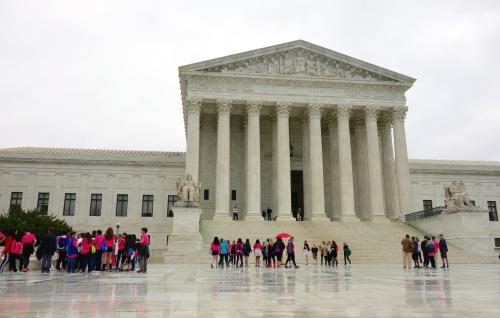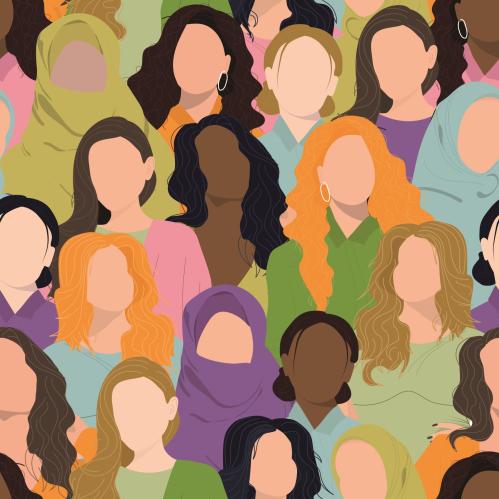This column is dedicated to my mom and other women like her
Elsie Mae Boyd worked as a domestic worker, cleaning white people’s houses through the 1950s and ’60s in Pittsburgh. When I was born in 1970, my biological mother struggled to take care of me so Elsie—the woman I call Mom—informally adopted my older brother and I, with my younger brother joining us a few years later. Mom only had an eighth-grade education, so to make money, she and her daughter Mary “watched,” aka took in or babysat, about a dozen other kids for a nominal fee while she reared us. Mom and Mary provided financially for our family with their social security and disability checks. While they didn’t make much money, I never felt poor. Looking back, I realize Mom did whatever it took to make us feel happy and safe.
I had no idea growing up that Mom and women like her were looked upon with contempt. In 1976, as he began to make his case for the presidency, Ronald Reagan repeatedly used the pejorative phrase “welfare queen”—a dog-whistle reference to Linda Taylor, who had defrauded the U.S. government of hundreds of thousands of dollars through elaborate schemes. Reagan popularized a narrative that urban plight was caused by black people living large while on the dole and using drugs. When installed as president in 1981, Reagan began undoing much of the War on Poverty legislation, as well as affirmative action mandates imposed on the federal administration and put in place by President Lyndon B. Johnson, retreating from prior administrations’ efforts to eradicate the vestiges of segregation.
But the reality is far from Reagan’s rhetoric: Black mothers have always done everything within their power so that their children can have a better life. It is society that has failed them by not reciprocating their efforts. It’s time to stop blaming black women for the ills in our communities and to celebrate their progress with policies that can accelerate growth.
For instance, when I was born in 1970, less than five percent of all black women who were the head of their households had some form of postsecondary educational attainment, according to 2017 census data that I compiled. However, the number of black women with two or more years of college has skyrocketed to approximately 33 percent as of 2017. When I was growing up, Mom took in kids to advance my family. Today, she would have probably raised us while also going to college.

Black women like my Mom continue to do what’s best for their family, but the idea of the welfare queen continues to stick.
In April, a principal in Houston, Texas announced a dress code ban for parents that disproportionately targets women of color with its emphasis on hair bonnets, revealing tops, short shorts, and mini-dresses. The school is 58 percent Hispanic and 40 percent black. The principal apparently blamed students’ lack of achievement on brown and black moms.
The dress code for parents is symptomatic of the widespread belief that black parents don’t value education. I wrote in a 2014 Washington Post editorial, “The default opinion has become ‘it’s the parents’—not the governance, the curriculum, the instruction, the policy, nor the lack of resources—that create problems in urban schools.” I went on to point out that, “everyday actions continuously contradict the idea that low-income black families don’t care about their children’s schooling, with parents battling against limited resources to access better educations than their circumstances would otherwise afford their children.”
It’s time to stop blaming black women for the ills in our communities and to celebrate their progress with policies that can accelerate growth.
Just as my Mom found a way to make enough money to help me feel secure, black women are attaining an education to do the same. Education is directly correlated with the degree to which single mothers live in poverty. For each additional level of educational attainment, the poverty rate of single mothers falls, on average, by 33 percent. Of single mothers in America, only 13 percent with bachelor’s degrees live in poverty, while 41 percent of those with only a high school diploma do. Black women are maximizing the power of the college degree to support their families.
The education of black women who are the head of their households flies in the face of people who can’t shake the welfare queen label that was as false then as it is now.
Black women also face gender disparities in the workforce, which throttles their pay. Earning differences along race and gender lines show that employers are exploiting black women’s effort and work. (God forbid you are black and LGBTQ!) Black women have lower earnings than black men, white men, and white women. Stingier pay stubs prevent black mothers from being able to properly take care of their families.

The beautiful irony is that my mother provided the kind of support that could have accelerated the higher educational attainment of today’s moms. Childcare assistance is one of the most effective ways to assist single mothers in balancing education and family responsibility. However, access to on-campus childcare has been decreasing over time. In 2015, less than half of four-year universities and community colleges offered childcare. At schools where such services are available, waitlists average 80 children. In a 2017 study, Monroe Community College in Rochester, N.Y. found that parents who had access to campus child care were three times more likely to graduate on time and nearly twice as likely to return to campus each consecutive fall.
Supporting single mothers through education offers a greater return to families and the community at large than the costs. Going to college helps single mothers to access professional networks. On average, attaining a four-year degree increases single mothers’ earnings by 78 percent. Education empowers single mothers to support themselves and their families.
Colleges, universities, and pay parity laws can support black women well beyond Mother’s Day. It’s not just a rose they want (though they’ll take that too). Better policies are what they are owed. And that will last a sight longer than a token flower.







Commentary
Skip the flowers this Mother’s Day, and invest in moms instead
May 10, 2019